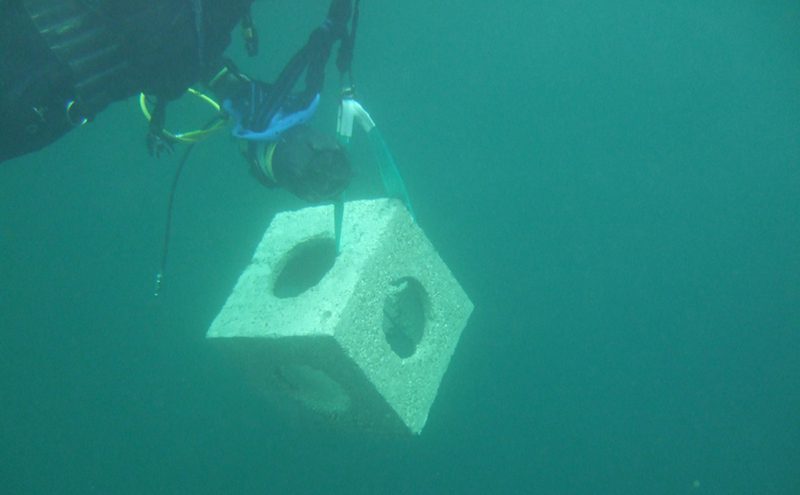
A small Devon-based company proposes to block illegal fishing boats and trawlers in the world’s oceans by deploying artificial reef structures on the seabed of marine-protected areas.
“With pirate fishing becoming so widespread, we need to deter this practice in a way that doesn’t require constant physical policing,” said Tom Birbeck, ARC Marine’s co-founder.
“Our artificial structures can be interlocked to form large megalithic subsea structures, which would prevent towed fishing gear being used on the seabed where they are deployed.
“We like to call them ‘sleeping policemen’”.
Aside from preventing illegal fishing, ARC Marine’s man-made reefs are said to provide a protective marine habitat for endangered and declining species, boosting the stocks of overfished species and protect coastlines and underwater habitats from erosion – something that poses a significant risk to our environment.
“Considering that 93 per cent of CO2 is stored in algae, undersea vegetation and coral, preventing marine degradation is crucial to protecting the earth’s atmosphere.” Warns Birbeck.
Although there are established Marine Conservation Zones (MCZ) in the UK, government bodies responsible for management have voiced concerns about small budgets and a lack of planning.
Marine conservation expert Prof. Callum Roberts at the University of York criticised the MCZs as useless “paper parks” that offer no real protection from the dredging and trawling that has devastated large areas of England’s seas for decades.
Chair of the environmental audit committee (EAC) committee, Joan Walley MP, complained about a lack of strategy in place to rebuild damaged habitats. He said the government must stop trying to “water down” its pledge to protect UK waters and “move much more quickly” to establish further protection zones and ensure they can be enforced.
Birbeck insists that ARC Marine’s structures are the solution, able to act as “sleeping policeman” within MPA and MCZ designated areas:
“Our artificial reef structures can be connected to form massive subsea structures. These can cause considerable damage to towed fishing gear – which will deter pirate fishermen from entering the area as they don’t want to risk damaging their equipment.
“Boat users can also use our reefs as moorings, without the need for anchors which can also damage a range of marine habitats.”
Permanent seabed structures would allow government bodies such as the Inshore Fisheries and Conservation Authorities (IFCA) and the Marine Management Organisation (MMO) to save time and resources on patrolling protected waters. It is impossible to police these areas 24/7 and the illegal fishing industry knows this. ARC Marine’s solution negates the need for regular patrols, thus saving time, money and resources – as well as offering a more carbon-friendly solution than fueling boats to cover the area.
GPS trackers for fishing vessels are currently voluntary. These devices record the location of vessels every 1-2 hours, but are unable to detect towed equipment.
Birbeck believes that his small Torbay start-up can tackle illegal fishing and become a world leader in ocean conservation. However, he says that the UK government must set a precedent when powers over fisheries are retuned to Westminster.
“With Article 50 now triggered, the UK government must set out its own regulations for phasing out bottom trawling and replacing the process with more sustainable fishing methods.
“By doing so the UK could become a world leader in sustainable fishing.”
ARC Marine is currently crowdfunding to build the world’s first multi-purpose, modular artificial reef and marine habitat. By being part of the crowdfunding campaign you can help secure the future of our oceans.






